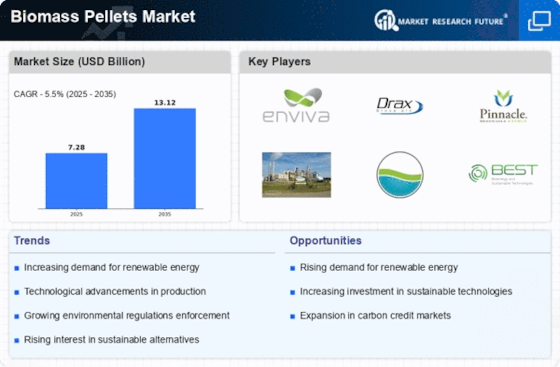Top Industry Leaders in the Biomass Pellets Market

The biomass pellets market is heating up, driven by rising concerns over climate change and the depletion of fossil fuels. These renewable fuel alternatives are made from compressed organic materials like wood residues, agricultural waste, and energy crops, and offer attractive options for residential and industrial heating applications. As the market expands, the competitive landscape is becoming increasingly dynamic, with established players and new entrants vying for market share.
Strategies for Success in the Biomass Pellets Market:
-
Product Diversification: Manufacturers are broadening their product portfolio to cater to different segments. This includes offering various pellet sizes, types (premium, standard), and certifications (sustainability standards). -
Geographical Expansion: Established players are venturing into new markets, particularly in Asia and Eastern Europe, where demand is burgeoning. Regional partnerships and acquisitions are facilitating this expansion. -
Sustainability Focus: Highlighting the environmental benefits of biomass pellets is crucial. Certifications like FSC and ENplus ensure responsible sourcing and production practices, resonating with eco-conscious consumers. -
Technological Innovation: Investing in efficient production technologies and pellet optimization can reduce costs and improve pellet quality, thereby enhancing competitiveness. -
Vertical Integration: Integrating across the supply chain, from raw material sourcing to pellet distribution, provides greater control over quality and costs. -
Supply Chain Optimization: Building robust and efficient supply chains is essential for consistent pellet availability and competitive pricing. This includes long-term contracts with suppliers and logistics optimization. -
Branding and Marketing: Effective branding and targeted marketing campaigns are crucial for differentiating pellet offerings and building brand recognition.
Factors Influencing Market Share:
-
Production Capacity and Cost: Companies with larger production capacities and lower production costs have a competitive edge. -
Quality and Consistency: Consistent supply of high-quality pellets ensures customer satisfaction and repeat business. -
Geographical Presence and Distribution Network: Strong presence in key markets and efficient distribution networks are crucial for market reach. -
Sustainability Practices and Certifications: Adherence to sustainability standards and certifications fosters trust among environmentally conscious consumers. -
Government Incentives and Subsidies: Government support through policy measures and financial incentives can significantly boost demand in specific regions.
List of the Key Companies in the Biomass Pellets market include
- Drax Group Plc
- Enviva
- German Pellets GmbH
- AS Graanul Invest
- Pinnacle Renewable Energy Inc
- Lignetics
- Zilkha Biomass Energy
- Fram Fuels
- Abellon CleanEnergy Limited
- Ecostan
- JP Green Fuels
- The Westervelt Company, Inc
- Forest Energy Corporation
- New England Wood Pellet
Recent Developments:
February 2022: The SAMARTH program was started by the Indian government. This program has been introduced to encourage the use of biomass in thermal coal power plants. The effort aims to cut down on stubble burning and air pollution.
In September 2022, her wood biomass facility was commissioned by Enviva at George County, Mississippi, thus helping this company to meet an annual allowable production capacity of 750,000 metric tons per year (MTPY).
In April 2022, Drax Group PLC opened a new pellet plant useful for converting sawmill waste such as sawdust, chips and shavings into sustainable biomass pellets in Demopolis, Alabama.
April 2022: Twin Track wood pellet technology was introduced by CPM. The goal of the new technology is to increase the effectiveness of wood pellet mills.










